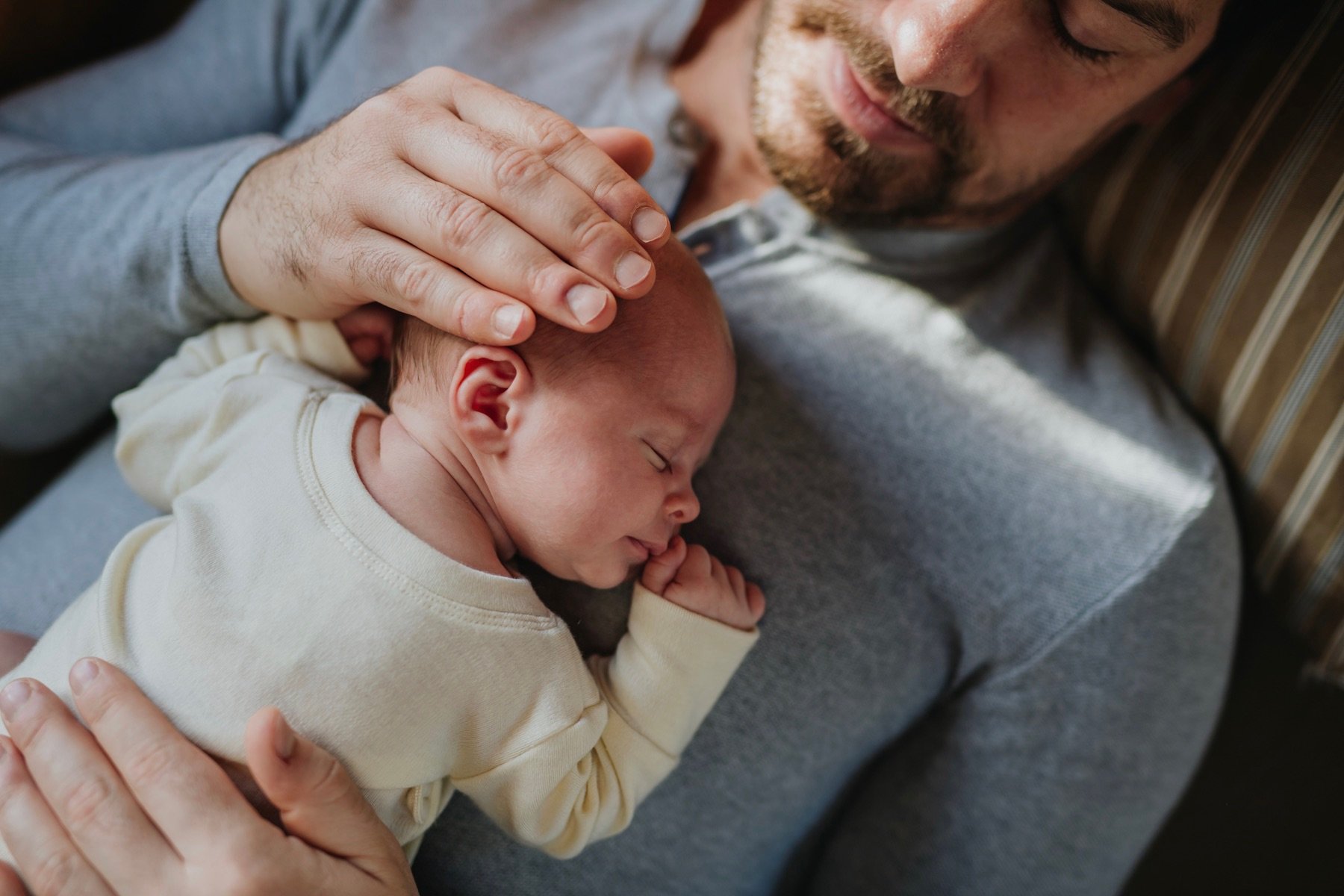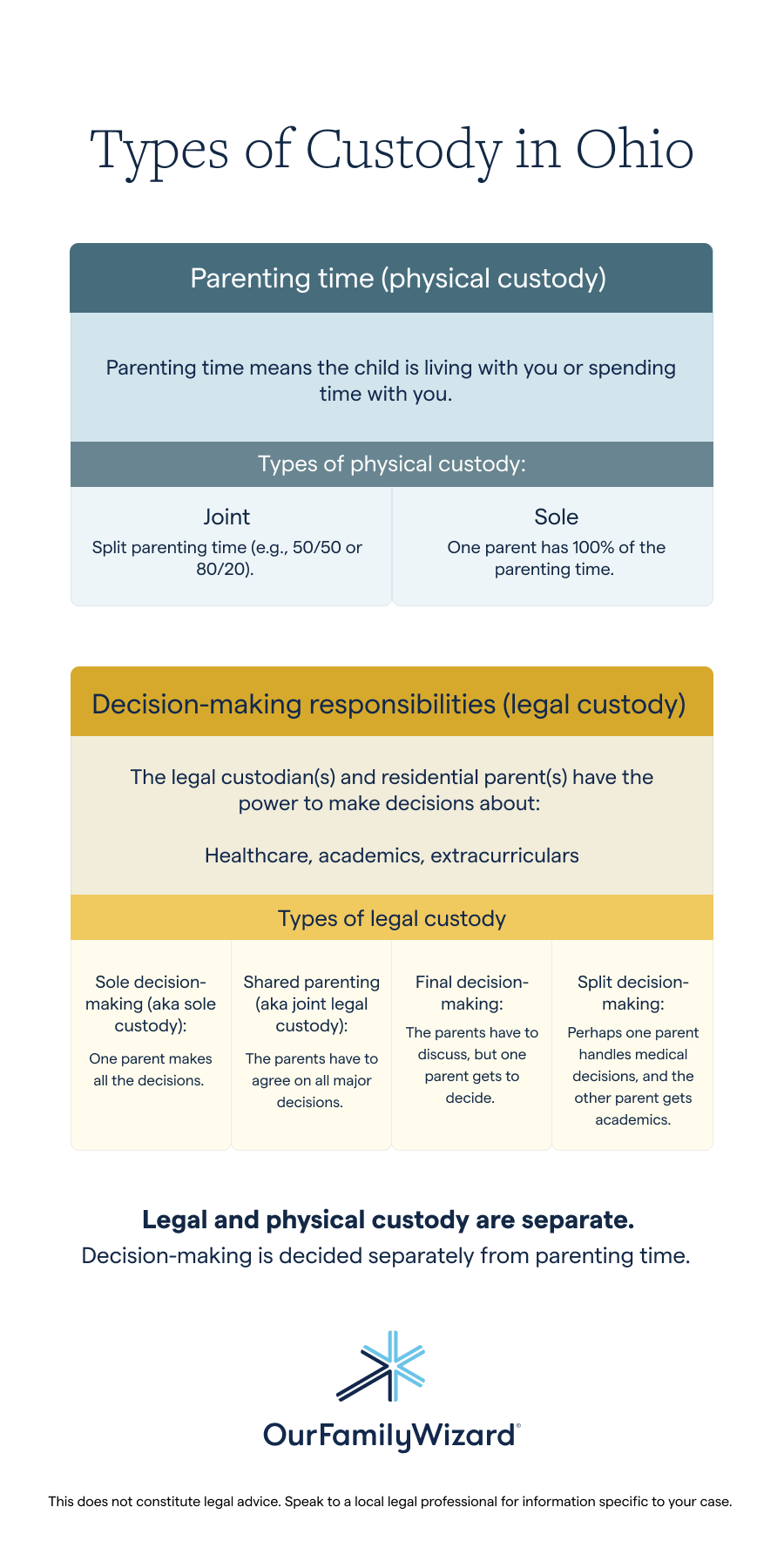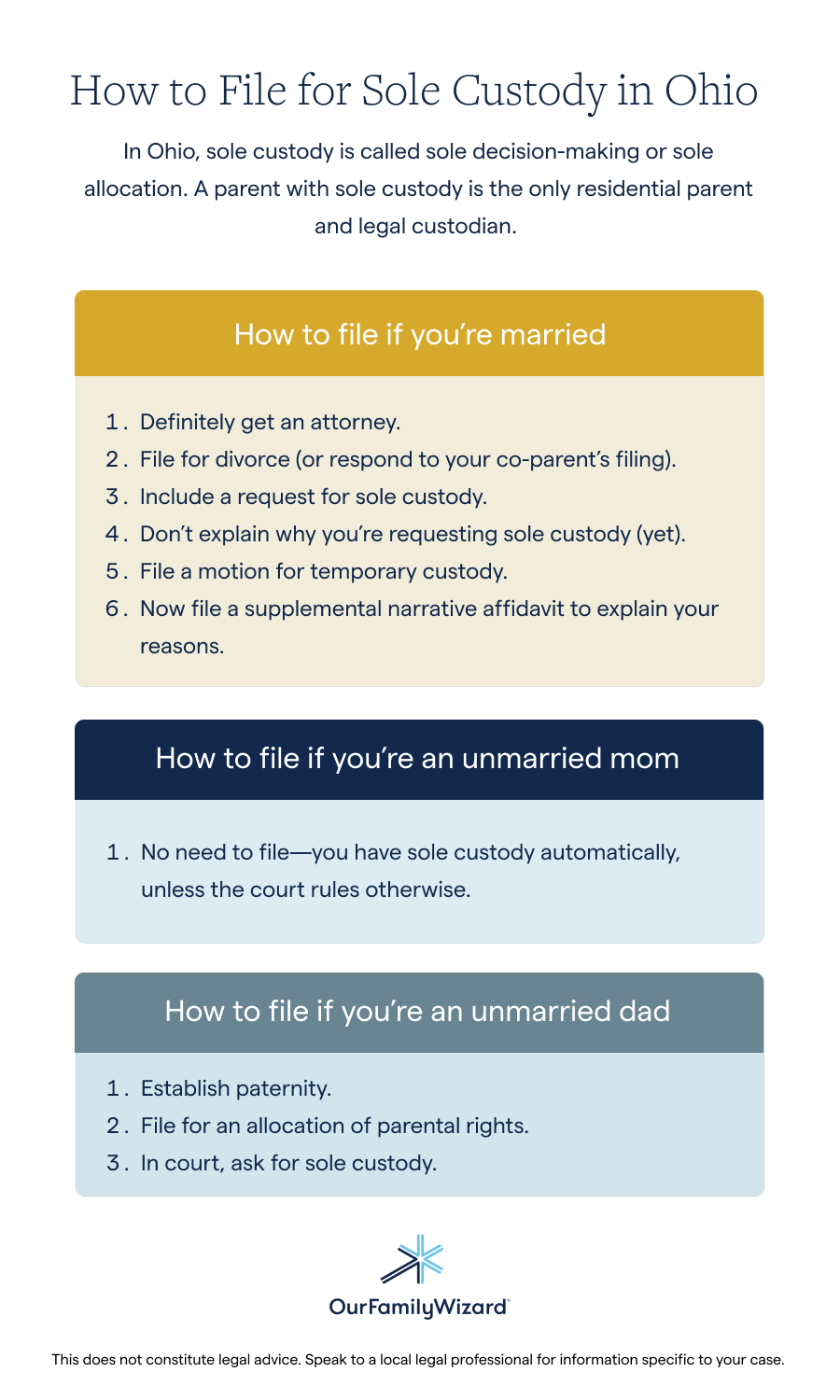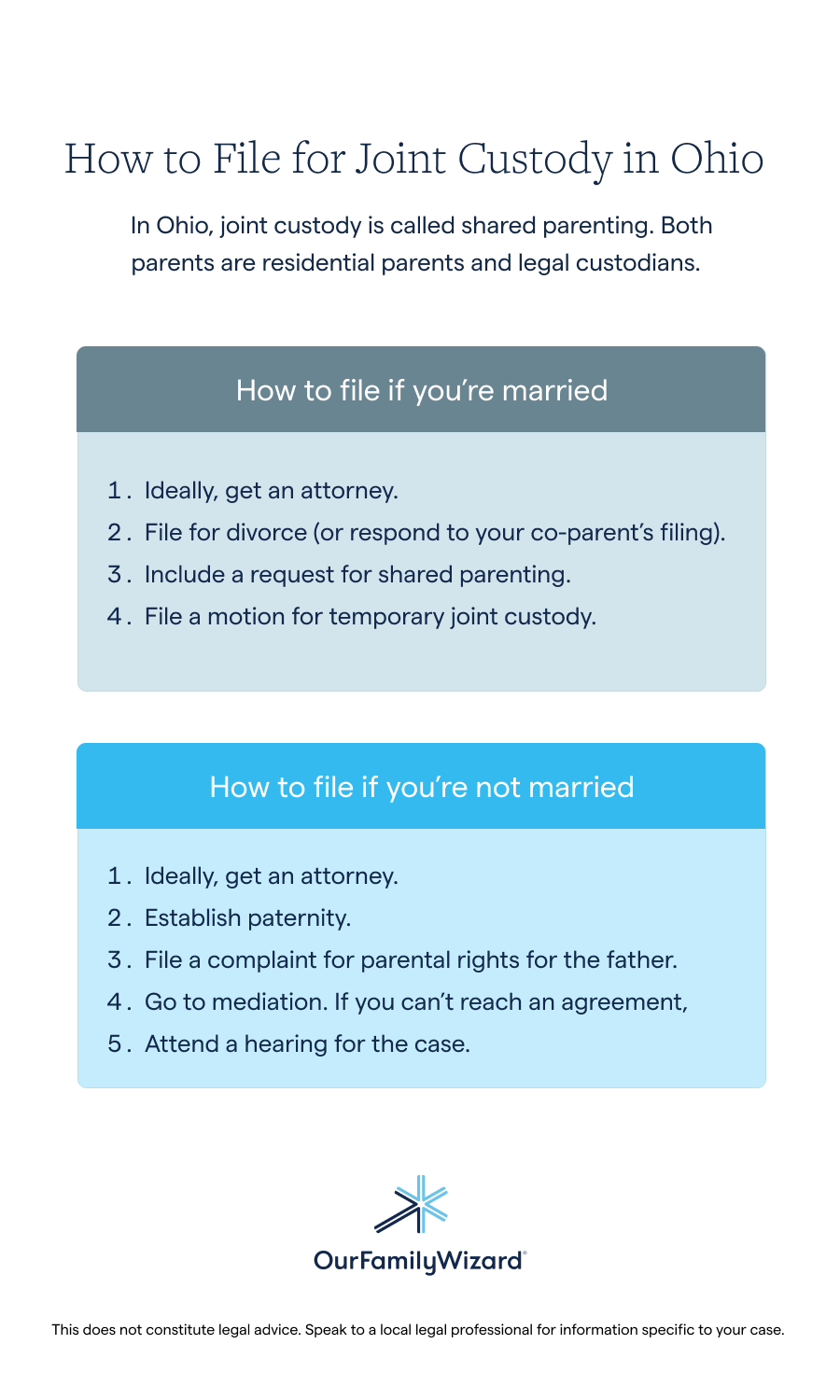Child Custody in Ohio: Types, How to File, and Parent FAQs
Ohio custody laws can be complex. It depends on whether you’re married and what type of custody you want. Three legal experts share step-by-step processes for how to file. Plus, a custody evaluator explains how custody decisions are made.
How does custody work in Ohio?
Custody laws depend on whether you’re married. If you’re married, shared parenting and shared parenting time are standard. If you’re an unmarried Mom, you probably have sole custody. If you’re an unmarried Dad, you might have to prove you’re the Dad.
Download the Ohio custody reference sheet
Proving paternity means proving you are the child’s father. “For married parents, paternity is established automatically,” explains Ellen S. Mandell, family law attorney.
“When you get divorced,” she adds, “the court is even required to ask whether or not the wife is pregnant, because any child conceived and/or born during the marriage is presumed to be the child of the marriage.”
Establishing paternity if there’s infidelity
Paternity is established automatically even if infidelity is in the picture, Mandell explains. “I've had cases where the mom was 8 or 9 months pregnant by the time we got to the divorce, and it wasn't the husband's child. We had to go on the record, and if the child was born before the divorce decree’s final hearing, then we had to have genetic testing done to absolutely establish that her husband was not the parent of the child. Because otherwise he's got an obligation to support the child.”
The laws used to be even stricter. “The law in Ohio used to say that if you were the husband in a divorce, and a child was born during the marriage, and you assumed it was your child, and you later found out it was not your child, then the presumption was irrebuttable.”
In other words, you couldn’t ask the court to change your child support obligation, “even though it was absolutely determined this child was not yours. The law changed because of those kinds of situations. It was grossly unfair to have a man have to be obligated to support a child that was not his if he didn't want to.”
Sometimes, the man wants to support the child he thought was his. “Many times, what happens is a child is born, and the husband believes it's his child. He loves the child. He has a relationship with the child. He supports the child. And then he finds out it's not his child. He still has a relationship with that child, so many times he doesn't care. ‘I will continue to support this child. I love this child.’”
Establishing the father’s parental rights in cases of infidelity
“There can then be a post-decree battle about whether or not this man has any kind of parental rights at all,” says Mandell. “Or it could be a pre-decree battle if the child was born when they're still married. When they get a divorce, and for the first time the wife says, ‘Oh, by the way, this isn't your kid,’ the court can determine that the husband and this child have a relationship.
“Then the court may give him companionship rights.” (It’s not the same as parenting rights, but it guarantees they get to spend time together.)
Sometimes, warns Mandell, “a party will use a child and parenting/companionship rights as an issue.. And that's just horrible. You need to get people on board with the idea that this is about the child. It's not about you.”

“In Ohio,” explains Mandell, “the law provides that the unmarried mother of a child is the presumptive sole legal custodian of that child.” In other words, “No other person has any parental rights for that child until a court rules otherwise.”
Difficulties and complications for unmarried parents
Co-parenting can be complicated when you’re not married. Amy McKinlay, family law attorney, shares an example. “I'll have someone come in and say, ‘Well, I want the baby to go to Dr. Smith, the pediatrician.’ But Dad says, ‘No way. I think Dr. Smith is incompetent.’
want the baby to go to Dr. Smith, the pediatrician.’ But Dad says, ‘No way. I think Dr. Smith is incompetent.’
“Well, under the statute, if you are an unmarried father, you don't have the right to make that decision. Mom can pick the pediatrician, and there's nothing you can do about that, unless and until you petition the court for custodial rights.”
Additionally, “An unmarried mother could theoretically bar the unmarried father from seeing the child. There might be compelling reasons for that—say Dad is abusive, or Dad is a drug addict, or Dad has some significant mental health issues, and perhaps his unfettered access to the child presents a danger to the child. That's one thing.
“But if it's just because he's a horrible boyfriend, that doesn't mean that he is also a horrible Dad. I counsel a lot of unmarried women that way, to really think through what they’re doing, because it could end up backfiring on you in court.
“Even though unmarried mothers have that statutory authority, they need to wield it wisely.”
How to establish paternity in Ohio
If an unmarried father wants to have parenting rights, he has to establish paternity. In other words, he has to prove that he’s the Dad. There are several ways to do this.
- At birth: “At the time of the birth, there has to be an entry in the birth registry of the State of Ohio, stating that he is the father," explains Mandell.
“The father must execute an affidavit of paternity,” says Ross Evans, former family law Magistrate, attorney, mediator, guardian ad litem, and parenting coordinator. “That gets him on the birth certificate. That can happen when the baby is born or anytime after the birth.
“It used to be that a mother could go in and name someone, and they'd end up on the birth certificate. That doesn't happen in Ohio anymore. The paternity declaration has to be an official document, on its brown-colored paper, that goes to the paternity registry.”

Someone who executes an Affidavit can seek to rescind it within a year of signing. There are also times that an individual, based on new evidence, will use the Court to seek to set aside that Affidavit. “I've had lots of cases where we've gone in and overturned those,” Evans says. “I've had some where we've done it even after the year mark, and I've had a lot of cases over the years where someone happened to be on the birth certificate and didn't even know it.
“And then they end up being charged with contempt for failure to pay child support, and we'd file to set aside the finding and to have genetic testing.”
If neither parent contests paternity, Mandell explains, “then the court can issue an order making the judicial determination that this man is the father of the child, and then that's sent to Columbus, and a birth certificate is issued that has the father's name on it.” - In Juvenile Court: The father can file an action in Juvenile Court, stating that he wants to establish paternity. He has to file in the jurisdiction where the child lives.
- Through a child support agency: “The father can go through a child support agency,” says Mandell, “to do genetic testing to determine if he's the father.” If the Mom says he’s not the Dad, then this step is mandatory.
How to establish parental rights for an unmarried father
After you prove paternity, you still have to establish parental rights. It’s a separate process. To do that, file a complaint for the establishment of parental rights and responsibilities.
Different counties have different processes. Mandell says, “I can speak primarily about Cuyahoga County. In Juvenile Court, in Cuyahoga County, the parents will first be notified. Once this action to establish parental rights and responsibilities is filed, the court will send the parents to the mediation department to see if they can work out a parenting arrangement. And if they can, it's done that way.
“The mediation process takes a couple of hours. They reach an agreement, they sign the agreement, and the agreement is then sent to the judge that's assigned to that case, and it's done.”
However, “If there's a dispute about parental rights and responsibilities, then it's processed like any other case. So if the mediation fails, it's then sent to the judge in that county, who then hears the parental rights case.”
Who starts the process to prove paternity?
Sometimes, the parents never even lived together or had only a brief relationship. That’s common in Juvenile Court.
“Sometimes,” says Mandell, “this whole process is started because the birth mother wants to get child support, and that may be the first time that the father knows that he even has a child.”
When the mother files a complaint to establish paternity, Evans explains, she can use the Child Support Enforcement Agency (CSEA) to establish paternity and child support. The agency will attempt to do so administratively, and if that fails, they can file with the court.
“Sometimes the child is already three or four or seven years old,” says Mandell. “In which case, then, the determination of parental rights is tempered by the interest of the child, who all of a sudden has another parent. That isn't a bad thing, but the Dad, generally speaking, has to be eased into contact with the child. You wouldn't send a kid for a two-week visit with a stranger. Those cases are a little tricky, depending on the age of the child and the relationship between the parties” (i.e., the parents).
Other times, the unmarried father begins the process. “Sometimes unmarried fathers will come in and demand sole custody of a child because there's some issue with the mom. Maybe child services have been involved because of child endangerment issues, or homelessness issues. The mom might not have the best situation for the child, and the father might actually be the most suitable parent.
“Those are tricky situations, because you talk about the age of the child, the contact of the child with both parents, and the relationship between the parties. It's much trickier in Juvenile Court than it is with a married couple who had a relationship and had a baby. But the Juvenile Court will deal with all of those issues and get them resolved. The same parenting statutes apply.”
There are two major types of custody in Ohio. Physical custody is time spent with your child. Ohio calls it parenting time. Legal custody means you get to make decisions about your child’s upbringing. That includes academics, extracurriculars, and healthcare.
Sole physical custody (all the parenting time)
In Ohio, physical custody is simply called parenting time. It’s when the child is physically with that parent. In some situations, one parent has 100% of the parenting time. That's similar to sole physical custody in other states.
In most situations, this is not ideal. It’s healthy for children to spend time with both of their parents.
Joint physical custody or splitting parenting time
In Ohio, we call physical custody “parenting time.” Both parents can have parenting time. They can split it 50/50, 60/40, 70/30, or whatever works for their parenting plan. Splitting parenting time is separate from decision-making.
If one parent has sole legal custody, the parents could still split parenting time. And if they have shared parenting, they can still split parenting time unequally.
Planning the parenting time schedule around school and work schedules
“In Ohio, every county has their own standard parenting schedule,” explains Evan. However, Parents can agree to any schedule they believe is in their child’s best interest and the Courts should not rely on template schedules. Under the Statute the Court of determining parenting time has to follow the requirements of the Statute in setting the schedule.
You can customize the schedule for your family. “We try to think of all the things that are going to come up, like where they're going to go to camp,” says Mandell. “We want to determine whether there are going to be activities, and can they be scheduled on the other parent’s time?” And what about family vacations?
Additionally, “We have to work around schedules. If you have a policeman or a fireman or a nurse, they work wacky schedules. Or some people work in manufacturing work, and they have split shifts, or they have rotating shifts and rotating days off.
“It's sometimes very difficult,” Mandell comments. “I've had clients who lived in Cuyahoga County, and the other parent lived in Summit County and started work at 7 o'clock in the morning. So, in order for the kid to get to school, the Summit County parent was having to get the kid up at 4:30 or 5 o'clock in the morning, and then drop him off at Mom's house, or even grandma's house, so that he could go to school when school opened, and Dad could get to work.
“It was difficult on the child, because you don't generally get kids up that early in the morning. So we had to create a parenting situation where mom basically had the kid during the week. Dad could have a dinner during the week, but he really couldn't have an overnight, because it was very taxing on the child.”
Ultimately, says Mandell, “You have to work out the schedule. And sometimes it's like calculus. It's mind-boggling. But all courts have standard fallback parenting time arrangements.”
Planning the parenting time schedule around your child’s age
“In Ohio,” Mandell says, “we try to have an age-appropriate schedule built into the parenting agreement. If you have a two-year-old and you create a parenting plan, that plan based on a two-year-old isn't going to take them through their teenage years. You're not going to do a week-on, week-off schedule with a two-year-old, because a two-year-old shouldn't be without either parent for that long.” But it might be ideal for a teenager.
“We don't want people having to come back to court to modify their parenting plan every single time something changes,” Mandell explains. “So we try to work it out in advance, if we can, because you can't predict what the future is going to hold.”
If there are multiple children in the family, then “the schedule for the oldest child controls. So you could have a two-year-old and a 12-year-old, and they're both going to Dad's house or Mom's house on the same schedule, unless the parents agree otherwise.”
When the child is a baby and is still nursing, this can create complications. “I have lots of those fights going on now, where moms don't want to let dads have kids because they're nursing,” says Mandell.
Planning the parenting time schedule around what’s best for the child
“You also have moms who are afraid to let their kids go,” Mandell says. “It's got nothing to do with Dad. It's got to do with the fact that they're a mom, and they think that they're the only ones who can raise this kid or be responsible for this child.
“Schedules used to be geared towards moms. In the routine schedules, Dad got a midweek dinner or midweek overnight (depending on the age of the child), and every other weekend. But the courts finally realized that developmentally, kids need to see both parents.
“You can’t say, ‘Just because they live primarily with Mom, you know they are okay.’ Because there is a dad out there who is perfectly capable of taking care of the child, a dad who has a relationship with this child. And the child has a relationship with this dad. So the courts have become much more attuned to the needs of a child, not to be separated from either parent for extended periods of time.”
It's a difficult determination, but “if your attorney is a good attorney, they’ll try to get you to look at it from the child's perspective, and to be realistic about whether or not the other parent is a good parent, even if they were a lousy partner.”
Legal custody in Ohio
The parent who has legal custody or is designated the residential parent gets to make decisions for the child. That includes decisions about where they live. It also includes decisions about discipline, academics, extracurriculars, and healthcare. The parents can divvy up these decisions in several different ways.
- One parent gets to make all the decisions. Aka sole custody, residential parent, sole allocation, or sole decision-making.
- Both parents share decision-making. They are both designated as residential parents and they have to agree on all major decisions. We call this "shared parenting."
- One parent has final decision-making. That means the parents have to discuss major decisions. But if they disagree, that parent gets to make the final call.
- Each parent can have different decisions. For example, one parent could make academic and medical decisions. The other parent could make extracurricular decisions.
The judge considers legal custody and parenting time separately. McKinlay says, “You can absolutely have a shared parenting plan where one parent has the vast majority of time versus the other. And, conversely, you can have a sole residential parent and legal custodian and a non-residential parent, but the parents share parenting time equally.”
Sole custody, sole allocation, or sole decision-making
Mandell explains, “Sole custody means that one parent is the legal custodian of the child and gets to make the educational, medical, extracurricular, and living arrangement determinations about the child.”
It’s rare for an Ohio court to grant full custody. “If folks have competent legal counsel, the vast majority of the time, the requests are for shared parenting. Except in situations where you have abuse of substances (whether that be drugs or alcohol), domestic violence, or significant mental health issues.
“In other words, on a scale of 1 to 10, if a situation is at a 9 or 10, you might ask for sole custody.”
You can also request sole custody, but mention shared parenting as a backup option. That’s more common, says McKinlay.
Sole custody vs. parenting time
Custody is separate from parenting time. Even when one parent has sole custody, the parents can still divide parenting time equally.
“That doesn't happen too terribly often,” McKinlay adds. “Far more often than not, this happens when the court has said, ‘Okay, we're going to give shared parenting a try.’ And then the parties are back in litigation, and it's determined that shared parenting is just completely impractical. But that doesn't necessarily mean that we don't want to continue to foster an equal parenting time schedule.”
Shared parenting (aka joint legal custody)
“There's no such thing as joint custody in Ohio,” says Mandell. “There’s shared parenting.” McKinlay explains, “If the court orders or grants shared parenting, both mother and father are the residential parent and legal custodian of the child.”
With shared parenting, McKinlay says, “You're standing on equal footing with respect to the law. The concept of shared parenting essentially maintains the status quo that exists between folks when they're married and have children.
Mandell adds, “Shared parenting is an arrangement that doesn't necessarily mean a 50/50 time split. It just means that the parents are going to cooperate in raising their children.”
Areas of decision-making responsibilities
Parents get to make decisions in three main areas:
- School and academic decisions
- Medical and healthcare decisions
- Extracurricular decisions
“In some courts, like Summit County and Lucas County,” Mandell explains, “you have to specify which parent will have decision-making over education, and which parent will have decision-making over medical issues, and which parent will have decision-making over extracurriculars.”
One parent can get all three decisions. Or, they can split it so one parent gets medical, and the other parent gets academics and extracurriculars. “Even in the case of a divorce where you have shared parenting, in Lucas County, they still make you designate the decision-making as to those particular issues.”
But every county is different, Mandell explains. “In Cuyahoga County, we don't do that. We will generally say that the parents will cooperate, and if they can't come to an agreement, then they will go to mediation. But sometimes we have to put something in, because otherwise you've got parents fighting, and nobody can make a decision.
“Now, those kinds of things don't usually occur in emergency circumstances,” Mandell says. “For example, if a kid has appendicitis, it doesn't matter who the decision-making parent is: They're having surgery.”
In most states, religion is one of the decision areas. But not in Ohio. “The court typically will not take religion into consideration,” says Evans. “In fact, there's an argument in Ohio that it would be unconstitutional for the court to consider religion and would be a violation of church and state.”
Religion can still play a role in the process, explains Mandell. “When there's religious differences, there may also be issues about which kind of education they're going to have. Are they going to a religious school? Are they going to a secular school? Who's paying the tuition?”
Ultimately, Mandell explains, “Shared parenting is a process where we try to get the parents to agree that they have a child together, and they're going to try to raise them, if not living together, but at least in a joint effort.”
How shared parenting (joint custody) affects school registration
“If there is shared parenting,” says Evans, “both parents are considered residential parents and legal custodians, regardless of where the child is at any point in time. The nice thing about shared parenting here is that since both parents are the residential parent, the child is allowed to enroll in either parent’s school district or any private or parochial school.
“In Cincinnati, we have some really great school districts, and then we have Cincinnati public schools. If one parent's living in Cincinnati public, and the other parent’s living in Sycamore schools, let’s say they want to access Sycamore schools. Even though the parent in Cincinnati has the majority of time, they still can enroll the child at Sycamore schools. They just won't get transportation from the house in the Cincinnati district.”
How to file for custody in Ohio
You can file for sole or joint custody. Each requires a different process. Your marital status also matters. It’s best to work with a lawyer who can guide you. But this step-by-step process also applies to people filing on their own.
To file for sole custody, include a request for sole custody when you file for divorce. In the divorce filing (known as the complaint), you can simply ask for sole custody. And you don’t have to explain why you’re asking for it (yet), says McKinlay.
Filing for sole custody in Ohio if you’re married
- Get an attorney.
“Generally speaking, you'd want to have a lawyer handle the divorce filing,” says McKinlay. “If for no other reason, most of the counties in Ohio (at least those that I practice in) have adopted an electronic filing system.
“And it's not that an unrepresented litigant can't get access to this e-filing system, but, as you might imagine, they're not always particularly user friendly. That can sometimes be a little overwhelming for folks who are having their 1st encounter with the legal system.”
It's tough to file pro se—by yourself, without legal representation. “As an individual, you're held to the same standard as a lawyer,” McKinlay warns. “So if you go to file a complaint, and that complaint is deficient, then I, as the opposing lawyer, might file an appropriate motion to have that complaint dismissed.
“Even though you're not an attorney and didn't know that you were supposed to have A, B, C, or D in that complaint, you're going to be held to the same standard.”
Specialized representation is important in family law. “There are an awful lot of nuances within the realm of domestic relations,” says McKinlay, “to the point where I think that you're certainly going to be best served by hiring someone who devotes their practice to this area of law.” - File a complaint for divorce. Or, if your co-parent initiated the divorce, file an answer and counterclaim.
- In the complaint or counterclaim, request sole custody. You can keep it simple.
McKinlay explains, “Typically down in the conclusory paragraph of your complaint, there’s a ‘wherefore clause’ where you're telling the court what relief that you're seeking.”
After asking for a divorce, “I like to put the custody demand next, because I think that is, and should be, the most important thing for folks who do have minor children.”
“In that wherefore clause, write something like, ‘Plaintiff requests that the court grant him or her sole residential parent and legal custodial status of the minor children.’”
You also need to establish that the court you’re filing in has subject matter jurisdiction. (In other words, this court oversees divorce complaints. You must also have personal jurisdiction. (In other words, the court has authority over the person you’re filing against.)
Sometimes, an attorney will recommend asking for sole custody, even if they don’t expect to get it. “This is sort of posturing on the part of the parties or the attorneys,” says McKinlay, “but you could request the sole residential parent and legal custodial status, but in the alternative, ask that the court adopt a shared parenting plan.”
If your co-parent filed first, you would make the same statements and requests in your counterclaim. - You do not need to include reasons why you’re filing for sole custody. “Not in Ohio,” says McKinlay. “That's something that certainly will get teased out in the course of the litigation, often with the aid of a guardian ad litem, who would be an attorney appointed to represent the best interests of the child.
“The reasons why a litigant would be seeking sole custody would be communicated to the guardian ad litem, who's essentially doing an investigation on behalf of the court to report back and make a recommendation as to what he or she believes to be in the child's best interests.” - Along with your complaint, file a motion for temporary custody.
“Pursuant to Ohio Civil Rule 75,” says McKinlay, “the court has the authority to temporarily allocate parental rights and responsibilities between divorcing parties.
There’s a specific form for a motion for temporary orders, “And it's essentially a checkbox system. And while there are a couple of lines where you can add a little bit of detail, it's rather bland.
It helps if you’re not still living together. “Some courts will take the position that if the parties are still living together, they're not inclined to issue orders about that,” says McKinlay. “But when folks have already separated, it's very important to get that temporary order requested.
“Essentially, temporary orders are a sort of Band-aid that gets us through from the initial filing of the complaint until the court issues its final decree of divorce and decree of shared or sole parenting.”
This is important for the children “because having rules in place will provide some much-needed stability during the period that the divorce is pending.” - After the court sets a hearing for temporary custody orders, McKinlay says, file a supplemental narrative affidavit. The affidavit can explain “the true allegations with respect to why Mom or Dad shouldn't have as much parenting time, or shouldn't have shared parenting—such as drinking or substance abuse or physical abuse or whatever the case may be.”
Filing for sole custody in Ohio if you’re an unmarried mother
If you’re an unmarried mother, then you're the sole residential parent and legal custodian by statute. You have sole legal decision-making power. In other words, you have sole custody automatically, says McKinlay. That only changes if the court issues an order that says otherwise.
Filing for sole custody in Ohio if you’re an unmarried father
- First, the father must establish paternity.
- As the legal father, he can file for an allocation of parental rights.
- The first time the parents appear before the judge, says Evans, the father can ask for sole custody. In other words, he can ask the judge to designate him as the residential parent and legal custodian. That’s instead of shared parenting.
When the parties appear in Court for the fist time seeking an allocation of Parental Rights, they stand as equals, and the Court simply has to consider what is in the best interest of the child. A father does not have to jump through hoops like a non-parent would.
To file for joint custody (called shared parenting in Ohio), request it when you file for divorce. It can look like this: “We are requesting shared parenting.” Shared parenting is standard, so it’s ok to keep it simple.
How to file for shared parenting if you’re married
- Ideally, get an attorney. Your lawyer will know how to navigate Ohio's electronic filing system, says McKinlay. They'll also make sure you include all the essential parts in your complaint.
Some people file pro se (by themselves, without legal representation). If you file pro se, the court will hold you to same standard as a lawyer. If you and your co-parent both request shared parenting, that might be ok. But if your former partner might request sole custody, it’s worth it to get an attorney. - File a complaint that requests a divorce. Or, if you didn’t start the divorce, file an answer and counterclaim.
- Towards the end of the complaint, explains McKinlay, there should be a “wherefore clause.” It explains what you’re asking the court for. If you filed for divorce, write, “The plaintiff requests shared parenting.” If your co-parent filed first, write, “The defendant requests shared parenting.”
- File a motion to settle temporary custody. This decision will split the parenting responsibilities until the divorce is final. In the motion, state that you’re requesting shared parenting.
How to file for shared parenting if you’re not married
- Ideally, get an attorney. Filing for custody can be complicated.
- Establish paternity (prove the father is the father).
- File a complaint for parental rights for the father.
- Go to mediation and try to reach an agreement about a parenting plan.
- If you couldn’t reach an agreement in mediation, there will be a hearing for the case. Attend the hearing and testify as required.
How to file for emergency custody in Ohio (full step-by-step)
In Ohio, a qualifying emergency must be serious. If your situation isn’t a true emergency, the court will disapprove. But if your child is in danger, this is the best way to get emergency custody so you can keep them safe.
- Contact the Child Welfare Agency. It’s important to do this before filing. Evans explains, “Judges will often ask, ‘Have you contacted the Child Welfare Agency?’ And if people say ‘no,’ then the court may say, ‘Well, then, that's what you have to do.’ (But if they think it's serious enough, they'll take action anyway.)
“I tried to avoid that. I happen to oversee Hamilton County's Child Services Agency on behalf of the County Commissioners, and they're overworked. They're underpaid, and they don't have enough people.
“But anytime I went in for an emergency order, I always made sure we had contacted the agency to tell them what's going on. That way, in court, when the magistrate said, ‘Have you contacted the agency?’ I could say, ‘Yes. We have contacted the agency, and because we were coming to court to seek an emergency order, they're not going to get involved.’ That’s what I learned through the experience of having sat behind the bench for 8 years, deciding custody cases!” - File a complaint or a petition for custody.
- Along with the complaint, file a motion for emergency custody. “Lay out why it’s an emergency,” says Evans.
Often, explains Evans, the Court says, “‘We're not going to grant emergency custody unless the child's life or limb is at risk of imminent harm.’ I used to be a magistrate, and a lot of magistrates and judges used to say, ‘Don't come to me unless the child's bleeding or homeless. If the child's bleeding or homeless, come with a Motion for an Emergency Order.’
“I used to oftentimes file for emergency orders, but I’d be happy if I just got a physical placement order if the court was hesitant to make a custody Order In Ohio, you can get those ex parte [talking to the judge without involving the other party]. Then there's a required hearing within 72 hours to maintain the ex parte order, if it's granted with notice to the other party.” - File a motion for an expedited hearing—if you’re in a county that allows it. “In my county, Hamilton County, Cincinnati, which encompasses southwest Ohio, you don't necessarily have to ask for emergency custody, but you can ask for a really quick hearing. Then instead of being six or eight weeks out, you might be two weeks out.”
- Testify in court on the date of the hearing.
- The court may grant you emergency custody.
- Then, someone must serve the parent with service of process. That means they have to deliver the petition, along with a summons from the court. The process server has to leave the physical paperwork pursuant to service rules. Your lawyer might hire a professional process server to find and serve the parent.
- Then you will appear in court again. Your co-parent may or may not appear as well—it’s up to them. “Typically,” says Evans, “the parent being served wouldn't show up for the hearing, and the court would maintain that emergency order of custody until there's a trial on the custody issue.”
Evans adds, “I'll give you the typical example. A grandparent will call me and say, ‘Over the last 15 years, my child has been addicted to drugs, and is off on a bender somewhere, and I've got their 3-year-old, and I don't know what to do.’”
Which court will hear your complaint?
In Ohio, there are a few ways this process can play out. It depends on which court should hear your complaint.
- Two courts might have jurisdiction. “When two parents file to terminate a marriage, they stand on equality when it comes to the custody of the child. Very seldom will a Domestic Relations Court grant emergency orders. Instead, you have to go to the Juvenile Court to get an emergency order of custody, and if there's a divorce pending, they oftentimes will say, ‘No, go deal with this in domestic relations.’”
- Domestic Relations Court can send matter to Juvenile Court. “There is a one-way street between those two courts in Ohio: A Domestic Relations Court can certify a custody matter to a Juvenile Court, if they believe neither parent is fit or suitable to have custody of the child. But the Juvenile Court can't automatically send something to the Domestic Relations Court.
“And, interestingly, for most of the parties that the Domestic Relations Court sends the Juvenile Court, the Juvenile Court says, ‘This isn't what I typically deal with. So they argue a little bit. Who cares?’ So it really becomes a very interesting dynamic. - Guardianship (in Probate Court). “In Ohio, we also have something called guardianship. Guardianship in Ohio is very similar to custody, but it's done in Probate Court, not in the Domestic Relations or Juvenile Courts.” Ohio Probate Courts explain that guardianship is “a legal relationship where an individual has the authority and duty to care for another's person or due to the other person's disability or incapacity.”
Evans continues, “Oftentimes even judges have asked me, ‘What's the difference between guardianship and custody?’ And there really is none except that most guardianships are not contested. The court typically won't do a contested hearing for guardianship. If someone is fighting it, they'll say, ‘Well, we're not going to grant it. Because you have a parent that's fighting this in Juvenile Court, it can be contested.’
“In my opinion, an order of custody is much more all-encompassing than an order of guardianship. So I typically had my clients always seek custody and not seek guardianship.”
In Ohio, these three courts—Probate, Juvenile, and Domestic Relations—belong to the Court of Common Pleas. “Some counties have a combined probate and juvenile court with one judge. Some counties have a combined domestic relations and juvenile court, maybe with several judges, but running under the same roof. There are some Counties with Probate and Juvenile Courts under the same Judges. And in many Counties, Probate is under its own Judge.”
How to file for visitation rights in Ohio (full step-by-step)
“Ohio doesn't call it visitation anymore,” Evans explains. “If it's the parent, it's called parenting time. If it's a non-parent, it's called companionship.”
If the parents were never married
- If you are the parent, file for parenting time. This is a simple legal motion filed in the Juvenile Court.
If you are a grandparent or another person invested in the child's life, file for companionship time in the Domestic Relations Court if the parties were married or in Juvenile Court if the parties were not married. There are times when a Grandparent wishes to seek companionship time, and the parents are currently married. That can not be easily accomplished in Ohio, and they should seek counsel from an attorney knowledgeable about this field. - If you are the Dad, you'll have to prove your paternity. In other words, you’ll have to show that you've been legally determined to be the father.
- Appear in court. Testify about why you deserve parenting time or companionship time.
If the parents were or are married
- File for divorce, if you haven’t yet. “If the parties are separated and they've not yet filed for divorce,” Evans cautions, “the Juvenile Court's going to say, ‘Go file for divorce and let the Domestic Relations Court deal with it, so that you're not doing it twice.’ When I was a Juvenile Court magistrate, I requested lots of people to go file for divorce, just to avoid having to do two trials.” Having said that, if there is no divorce filed, Juvenile Court does have the statutory authority to hear the matter.
- File a petition or a complaint for parenting time (or companionship time). Your lawyer will pick the appropriate court to file the motion in.
- Appear in court. Testify about why you deserve parenting time or companionship time.
In a custody case, the judge has to figure out what’s best for the child. They rely on a list of factors that influence the child’s best interests. You can find the official list in the Ohio revised code section 3109.04 (F)(1). But we’ll explain it all below.
Jamie Nieson, a parenting coordinator and child custody evaluator, investigates these factors. Then she makes recommendations to the court. “Essentially, I'm going to be looking at a parent's capacity to make decisions for their child’s best interests.
“Do they understand their child's needs? Can they demonstrate decision-making and judgment that's supportive of their child's needs and environment? What is their capacity to co-parent? Do they have any mental health concerns, criminal history, legal problems, or substance abuse that might impact their decision-making for their child? We also evaluate their capacity to co-parent with another parent.”

Here are the official factors:
- What the parents want
Of course, the parents’ desires play a role. But if they disagree, the judge can move on to other factors. - What the child wants, if the judge has interviewed the child
Evans explains, “If the judge interviews the child, it’s done in chambers [i.e., in the judge’s office], where the wishes and concerns of the child are expressed to the court.” In these cases, the judge also has to appoint a guardian ad litem, a legal professional that investigates and represents the child’s best interests. “As a magistrate, I typically followed the age of the ability to testify without being qualified. So under seven, the court really doesn't care. Between seven and 11, you'll give it some weight, but not a lot. At 12 and up, you're going to give it a lot of weight.” - The child’s relationships with their parents, siblings, and any other significant persons in their life
“What's the makeup of the families?” asks Evans. “What's the child’s relationship with the families? Are there step-siblings, are there half siblings? Are there grandparents that are involved? That is the circle of support for the child, or—as a lot of psychologists like to call it—the social value of the child” - How well the child has adjusted to their home, school, and community
“How's the child doing in school?” Evans asks. “Are they involved in extracurricular activities at one parent’s home versus the other?” Do they have close personal connections to one parent or in one parent’s community, more than the other’s? - The mental and physical health of the child and parents (and anyone else involved)
“In Ohio, this opens up the door to people being evaluated forensically on mental health issues,” explains Evans.
“If someone files a motion to order a party to submit to a mental health evaluation, they have to do it. But I like to tell clients and other practitioners, ‘Don't just evaluate one person, because if you evaluate one person in a vacuum, you're not going to get really good information.’
“And it really needs to be a forensic custody evaluation. But finding those individuals willing to do it in Ohio are far and few between. There aren’t a lot of them that are still willing to do it, because there has been a lot of litigation over the years over whether or not they're qualified to make that determination.”
Nieson explains, “Say Mom has an active psychosis history. She might have some pretty significant delusions, but they don’t appear to impact her parenting. And at what point would it impact her parenting and become risky? And how do you make those decisions? If a person is mentally ill, or has another diagnosis, that's not enough to say that they can't parent. I'm looking at the behavioral pieces and judgement that impact active parenting.
“In one case, Mom was consistently seeing her psychiatrist, she consistently was going to therapy, she was holding a job. However, when you listen to her, delusions are apparent. She believes them to be true. And yet at that moment I can't say, ‘Well, that's of impact to your child.’
“In a custodial evaluation,” explains Nieson, “I'm also looking at the age of the child. If it's a three-year-old child, they cannot self-protect. They don't have that reasoning. They don't have that capacity to keep themselves safe. Whereas if it was a 14-year-old child, they could say, ‘Well, Mom's acting weird.’ It’s not something they should have to deal with, but they have a little more capacity to regulate and to protect themselves if necessary.
“So those are some of the components that we have to consider. Age and developmental awareness, and parental awareness of those developmental stages, are critical.”
Nieson gives a specific example. “With one parent in particular, one of the delusions that she manifested was that she was reincarnated, and she used to be an Egyptian queen. She believed that other people understood her and that she understood them—people she's never met—and that she could receive messages from them, and she could deliver messages to them through certain eye contact.
“These messages were never about self-harm or hurting anyone. They were, overall, of a positive nature. They had nothing to do with the kid. That's a challenging one, because it sounds okay—but what if it generalized? What if she began getting messages from her child that she wasn't getting? Those are really tricky situations.” - Which parent is more likely to honor the other parent’s parenting time
“Is the parent more likely to honor and facilitate court-approved parenting time rights or visitation or companionship rights?” Evans asks. “I've had cases where a parent has kept a child away from another parent for a period of time, without a court order, and the court will take that into consideration.”
Nieson explains, “Sometimes, we see a parent who really can't understand their child's needs outside of their hatred for the other parent. ‘I love my kid, but I hate my parent more.’ As much as I want to believe that you can show up for your child, I don't believe that you're able to consistently, because you're holding on to, and likely acting with, such resentment.
Handling this situation looks different for each family, but “it depends on a spectrum of how bad this situation is. If this wasn't an issue, would this parent have that capacity? Are there possible remedial efforts? Could these parents potentially work together if we had a little more time and resources? So parent coaching, parent coordination, some of those added pieces, could help them do it together.
“Other times, we have this repeated history where that parent has never been willing to work with their co-parent, and will say ‘no’ just because it's the idea of the other parent. I have no reason to believe that could change or could look any different. Then you're also indicating to me that you don't have the capacity to make good judgment calls because of that. Then we might be looking more at a sole custody decision.” - Whether the parent paying child support is actually paying it (on time)
“There is a factor about having paid child support,” Evans explains, “but the courts seldom take money into consideration. So even if a parent owes back support, the court might not care.” - Whether either parent has been convicted of any criminal offense involving child abuse or child neglect
“There is a factor for being convicted or pleaded guilty to child abuse or child neglect,” says Evans. “If the parent has been adjudicated for any of those things or any violent offense, that's a factor that gets taken into consideration.”
“If there’s a history of domestic violence,” says Nieson, “that's a really tough one for me as a custody evaluator, because I'm not the arbiter of the truth. It's not my job to decide whether it did happen or didn't happen. I'm looking at the capacity of each parent to protect their child and participate in a co-parenting relationship.
“Domestic violence allegations, or allegations of physical abuse or sexual abuse of the child, are unfortunately pretty common. I can't be the arbiter of the truth, but I can consider, what is everybody's capacity to effectively address those issues? - Whether either parent has prevented the other parent’s parenting time
If one parent blocks the other parent’s parenting time, the court will hesitate to give them custody. - Whether either parent is living out of state or planning to move out of state
Say the child is very attached to their home, school, and/or local community, but one parent is living far away or moving far away. The court will take that into consideration.
More details about how a child custody evaluation works
A child custody evaluation determines whether the parents can care for the child. But, Nieson says, “We also want to give resources that outline what is going to be effective for the family.
“Previously, child custody evaluations were getting away with saying things like, ‘Oh, the kid needs therapy. Put him in therapy.’ And now we're getting a little more specific: ‘Actually, the child might be fine. It's the parents who aren't functioning. So this is what each parent should be doing. This is who they should be working with. This is the type of modality that would benefit them each.’ The more detail we can give, the better.
“We want to aid the court in supporting these parents and being progressive and effective in the future. We have a chance to really educate these people on what can be helpful, as opposed to just saying, ‘Here's what's wrong with you. Best of luck.’”
An opportunity to agree before the report is written
Niesen explains her approach further. “My practice is taking a slightly different approach to child custody evaluations than we've seen previously. Initially, I meet the parties, and engage with the collaterals, testing, and home visits as necessary. Rather than producing a report directly to the court, I first propose my recommendations to the parties and their attorneys and the guardian ad litem.
“I verbally provide the parties with my recommendations, and the rationale of how I came to these recommendations. Parties can then decide, with their attorneys, if they can use my recommendations and work towards settlement.
If parties cannot reach some settlement, then ultimately, I will write a full report for the court. But there's an opportunity to save these people significant time, money, and energy. I think this will make these services so much more accessible to people that can't otherwise access these evaluations when they're necessary.
“That's my hope, that we can bring in a new approach and give these people more agency—a lot more control over what the outcomes will be.”
How Nieson decides to recommend sole custody or shared parenting
One of the most common problems, explains Nieson, is “if we see that both parents absolutely cannot get along. They both fight. Neither parent is ever going to move from their position. So it's not that one is better than the other, it's just that they can't do it together.
“And then we have to get a little creative. I can't always make an argument that one parents decision making is better than the other. I just know they absolutely can't do it together. Not being able to work together is distressing for the child(ren).
“So I might be looking at, who's the primary parent? Who's doing more of the homework? Who has more contact with the teachers? Who's signing them up for Soccer Camp? It's not that one is better than the other, but coordination is just impossible, and the child's missing out, so we have to delegate it somewhere.
Niesen’s goal is to discover, “What is the best approach we can take to preserve each relationship of the parent and the child? I recognize that we all have our own issues. The question is, how well can you manage that? How much can you regulate yourself and show up for your child first?
“I see my role as a custody evaluator as being the expert on the best interests of your children,” Niesen concludes. “My recommendations are based off current child development research as well as research regarding conflict resolution. I believe it is critical for recommendations to be personal to the family dynamic and also accessible to implement in the current family setting.”
Ohio’s best co-parenting app for child custody
OurFamilyWizard, which is frequently court-ordered in Ohio, helps parents communicate on the record. The record highlights whether you're willing to work with your co-parent. And that can have a direct effect on custody decisions.
“I love OurFamilyWizard,” says Evans. “I do a lot of guardian ad litem and parenting coordinator work, and I make them use OurFamilyWizard in all my cases. So many times, the conflict is about communication. Whether the parents are married or not married, it's about communication. Plus the ToneMeter helps people write messages without escalating conflict."
Evans adds, “I almost always require it. I've never, ever, ever had a magistrate or a judge say, ‘No, we're not going to accept that recommendation.’”
With OurFamilyWizard, you can put your best foot forward. It gives you a chance to show the judge that you would handle custody well.
Use the best to help you manage child custody
Is Ohio a 50/50 custody state?
“Ohio currently is not a 50/50 custody state,” says Evans, “although there is pending legislation to make it one. There’s no presumption. It's simply a best interest standard, with shared parenting versus sole allocation as the two options.”
In 50/50 states, the judge assumes that splitting parenting time in half is the right choice. They make a different decision only if there’s a good reason for it.
But in Ohio, the judge will evaluate what is best for the child, starting with a blank slate.
Shared parenting is also known as joint custody in other states. Sole allocation is also known as sole custody.
What is the most common custody arrangement in Ohio?
In Ohio, shared parenting (legal custody) is the standard. But Ohio doesn’t have a standard parenting time split. That’s because it is not a 50/50 default state. In other words, the judge doesn’t start by assuming a 50/50 split is best.
But there are standard custody schedules. The schedules are based on the age of the child.
“In Ohio, every county has their own standard schedule. You can do whatever you want to do, if you reach an agreement with your co-parent, or the court can do whatever it thinks is in the child's best interest. But every county has a standard schedule for a parent to have parenting time.”
These schedules are based on the child’s developmental age. There are schedule options for birth to two years, two to three years, three to five years, 6 to 9 years, 10 to 12 years, and teenagers (13-18). The recommended schedule depends on these factors:
- Work schedules
- Living arrangements
- Distance from each other’s houses
- Whether the child has a bond with each parent
- Whether each parent has good parenting skills
- Who the child has been spending the most time with so far
- Whether each parent knows how to care for the child overnight (for younger children)
- Whether the parents can communicate and cooperate with each other
Can both parents be a residential parent in Ohio?
Yes, both parents can be residential parents. That is standard for a shared parenting plan. Both parents are residential parents and legal custodians, and both share parenting decisions. That’s useful because they can register their child in either parent’s school district.
If there is a sole allocation (sole custody), then only one parent is the residential parent. Along with that they get the full decision-making powers. Being the residential parent and owning decision-making always go together.
“The downside to a sole allocation,” says Evans, “is that the child can only be enrolled in the residential parent’s school district. The child cannot be enrolled in a non-residential parent’s school district.”
Being the residential parent doesn’t have a direct impact on the parenting time schedule. “The schedule is just one piece of the plan,” Evans explains. “I could have shared parenting with every other weekend for one parent and significant time for the other parent. And they're still both residential parents and their decision-making could be split. (One parent could have the right to make all decisions around medical treatment. One parent could have the right to make all decisions around extracurricular activities.)
“But the nice thing about shared parenting is that both parents being the residential parent, allows the child to be enrolled in either parent’s school district or any private or parochial school.”
When can children decide what parent to live with in Ohio?
The court treats children differently based on their age. The Ohio revised code (section 2317.01) explains it. Children under age 7 are not competent witnesses if it seems like they can’t get the facts straight.
Evans says the judge might evaluate the child based on more detailed age groups. For children up to age 6, the court doesn’t give much emphasis to their opinions. Between ages seven and 11, the judge will probably give it some weight, but not a lot. At 12 and older, the child’s opinion really matters.
However, “There's a lot of misconception in the State of Ohio about what rights a child has in making decisions like that,” says Nieson. “But that's a custodial decision, and so that always is going to fall on the parents.
“That being said, I think there's a certain stage where different courts might look at the child's reasoning, judgment, and how they're functioning, to determine whether they have reason to ask for a certain custody decision, and the court might honor that request. But that request is still made through a parent in court. There isn't a strict age where we're like, “Okay, now the kid gets to choose.”
Who can file for emergency custody in Ohio?
“Anyone in Ohio can file for emergency custody,” explains Evans. “Relative or non-relative, it doesn't matter. Obviously a relative is better, but it doesn't have to be a relative. Anyone can file for emergency custody.”
About the Author

Nikol Sotos is an attorney & educator who has practiced family law and taught secondary education. She currently serves as a Professional Liaison for OurFamilyWizard. Her role includes educating Judges, lawyers, and other family law professionals across the US on the online tools that can be utilized to benefit and monitor the parental communication process in family law cases. She is actively engaged in the legal community in her home state of Illinois and is a member of several bar associations and committees.
She graduated with a BA in English Literature from DePaul University, received her Juris Doctor from The University of Illinois Chicago School of Law and a Professional Educator License from National Louis University. She loves to cook for her family, travel with her husband and cheer on her children at their sporting events in her spare time.






